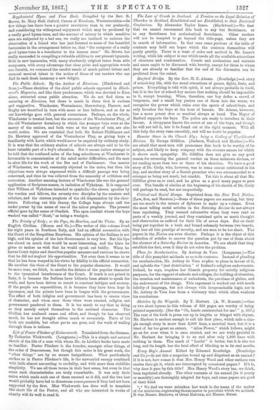The Public Schools. By the Author of Etoniana. (Blackwood and
Sons.)—These sketches of the chief public schools appeared in Black- wood's Magazine, and like their predecessor, which was devoted to Eton alone, attracted some public attention. We do not find them as amusing as Etoniana, but there is much in them that is curious and suggestive. Winchester, Westminster, Shrewsbury, Harrow, and Rugby are described in turn with more or less fullness, and as far as our knowledge goes with general correctness. Perhaps, on the whole, Winchester is treated best, but the accounts of the Westminster Play, of the old Westminster dormitory in which the younger boys were at the mercy of the seniors, and both were at the mercy of rats, are also worth notice. We are reminded that both Sir Robert Phillimore and Dr. Hawtrey approved of the Westminster Play, as giving boys a familiarity with Latin which would never be acquired by ordinary study. It is true that the ordinary studies of schools are always said to be the least valuable part of a boy's education. But it seems rather strange to be told that the confused noise of the long schoolroom at Winchester is favourable to concentration of the mind under difficulties, and fits men in after life for the work of the Bar and of Parliament. One master of Winchester, we read, constantly objected to the noise, but then his objections were always expressed while a difficult passage was being construed, and thus he was relieved from the necessity of criticism and correction. Another amusing feature of Winchester life was the general application of Scripture names, in imitation of Wykeham. It is supposed that William of Wykeham intended to symbolize the eleven apostles by the warden and fellows, the seventy-two disciples by the masters and scholars, and the sixteen prophets of the old dispensation by the chor- isters. Following out this theory, the College boys always call the under porter by the name of one of the minor prophets. The present .official goes by:the name of Obadiah. The open conduit where the boys washed was called "Moab," as being a washpot.


































 Previous page
Previous page